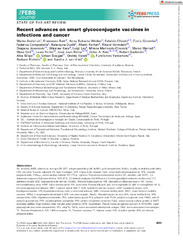Приказ основних података о документу
Recent advances on smart glycoconjugate vaccines in infections and cancer
| dc.creator | Anderluh, Marko | |
| dc.creator | Berti, Francesco | |
| dc.creator | Bzducha-Wróbel, Anna | |
| dc.creator | Chiodo, Fabrizio | |
| dc.creator | Colombo, Cinzia | |
| dc.creator | Compostella, Federica | |
| dc.creator | Durlik, Katarzyna | |
| dc.creator | Ferhati, Xhenti | |
| dc.creator | Holmdahl, Rikard | |
| dc.creator | Jovanović, Dragana J. | |
| dc.creator | Kaca, Wieslaw | |
| dc.creator | Lay, Luigi | |
| dc.creator | Marinović-Cincović, Milena | |
| dc.creator | Marradi, Marco | |
| dc.creator | Ozil, Musa | |
| dc.creator | Polito, Laura | |
| dc.creator | Reina, Josè Juan | |
| dc.creator | Reis, Celso A. | |
| dc.creator | Sackstein, Robert | |
| dc.creator | Silipo, Alba | |
| dc.creator | Švajger, Urban | |
| dc.creator | Vaněk, Ondřej | |
| dc.creator | Yamamoto, Fumiichiro | |
| dc.creator | Richichi, Barbara | |
| dc.creator | van Vliet, Sandra J. | |
| dc.date.accessioned | 2021-11-05T13:08:28Z | |
| dc.date.available | 2021-11-05T13:08:28Z | |
| dc.date.issued | 2021 | |
| dc.identifier.issn | 1742-4658 | |
| dc.identifier.uri | https://vinar.vin.bg.ac.rs/handle/123456789/9834 | |
| dc.description.abstract | Vaccination is one of the greatest achievements in biomedical research preventing death and morbidity in many infectious diseases through the induction of pathogen-specific humoral and cellular immune responses. Currently, no effective vaccines are available for pathogens with a highly variable antigenic load, such as the human immunodeficiency virus or to induce cellular T-cell immunity in the fight against cancer. The recent SARS-CoV-2 outbreak has reinforced the relevance of designing smart therapeutic vaccine modalities to ensure public health. Indeed, academic and private companies have ongoing joint efforts to develop novel vaccine prototypes for this virus. Many pathogens are covered by a dense glycan-coat, which form an attractive target for vaccine development. Moreover, many tumor types are characterized by altered glycosylation profiles that are known as “tumor-associated carbohydrate antigens”. Unfortunately, glycans do not provoke a vigorous immune response and generally serve as T-cell-independent antigens, not eliciting protective immunoglobulin G responses nor inducing immunological memory. A close and continuous crosstalk between glycochemists and glycoimmunologists is essential for the successful development of efficient immune modulators. It is clear that this is a key point for the discovery of novel approaches, which could significantly improve our understanding of the immune system. In this review, we discuss the latest advancements in development of vaccines against glycan epitopes to gain selective immune responses and to provide an overview on the role of different immunogenic constructs in improving glycovaccine efficacy. | en |
| dc.language | en | |
| dc.relation | COST [CA18103] | |
| dc.relation | Ministry of Education, Youth & Sports - Czech Republic [CA18103, LTC20078] | |
| dc.rights | openAccess | |
| dc.rights.uri | https://creativecommons.org/licenses/by-nc-nd/4.0/ | |
| dc.source | The FEBS Journal | |
| dc.subject | cancer | en |
| dc.subject | glycosylation | en |
| dc.subject | immune system | en |
| dc.subject | infection | en |
| dc.subject | vaccination | en |
| dc.title | Recent advances on smart glycoconjugate vaccines in infections and cancer | en |
| dc.type | article | en |
| dc.rights.license | BY-NC-ND | |
| dc.citation.volume | 289 | |
| dc.citation.spage | 4251 | |
| dc.citation.epage | 4303 | |
| dc.identifier.wos | 000656594400001 | |
| dc.identifier.doi | 10.1111/febs.15909 | |
| dc.identifier.pmid | 33934527 | |
| dc.type.version | publishedVersion | |
| dc.identifier.scopus | 2-s2.0-85107309134 | |
| dc.identifier.fulltext | http://vinar.vin.bg.ac.rs/bitstream/id/27922/bitstream_27922.pdf |
Документи
Овај документ се појављује у следећим колекцијама
-
Radovi istraživača
Researchers' publications

